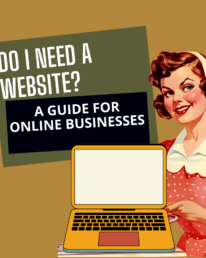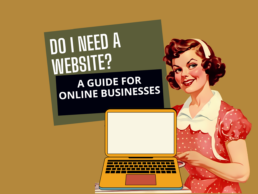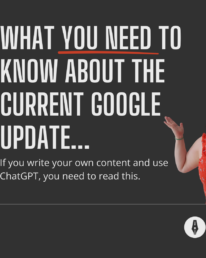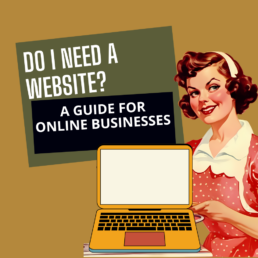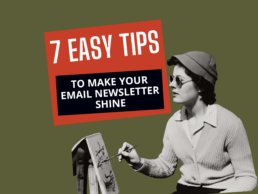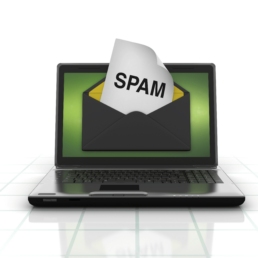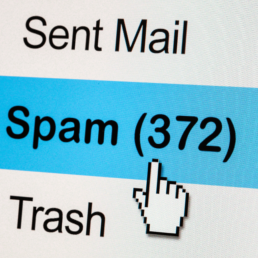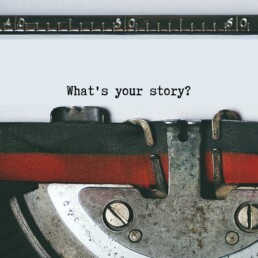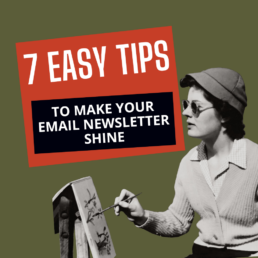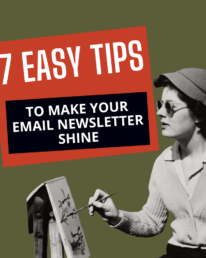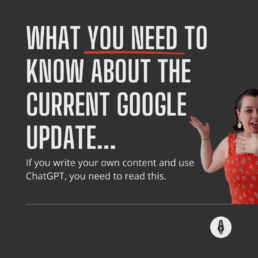How to DIY your website: The HOME PAGE edition

SEO
Ever since I became a copywriter, I’ve pictured standing in the middle of Grand Central Station whenever I write a home page.
Lots of pale, sand coloured marble. Avenues that take you to different trains. Huge arches you can’t help but stare at. Bustling with a range of people, from the dangerously tired to the eager tourist. Signs and stalls and stairways that promise more. Wanderers, travellers and explorers alike, all looking for that next step in their journey.
Full transparency!
I’ve written about this before.
BUT, it’s important, so I’ve written about it again!
And this time, I’ve tried to break it down more.
HOW TO DIY YOUR HOME PAGE
PART ONE: The train station
In my opinion, the home page is the hardest page to write on your website.
Why?
Because it’s got to appeal to more than one ideal client and that is usually a recipe for confusion. (Appeal to everyone and you appeal to no one).
But I like to think of the home page as the train station of a website.
Imagine Grand Central Station in New York.
Busy, bustling.
People looking for signposts on where to go.
Some people know what they’re looking for. They just need to find the right platform. A site search function is great for this (particularly on ecommerce sites).
Some people are just having a nosy around. (Clear signage to different sections, departments, offers or products let’s them know what’s available).
Some people know they want to travel but don’t know where to. They have questions. (Direct them to a blog, guides, video walkthroughs or FAQs).
The homepage needs to welcome people in, make them feel safe and direct them to another part of the website that will get them closer to what they need.
So the trick is to do that without being chaotic or confusing. Because your potential customers will just leave.
There must be something about the page too, that let’s people know where they are, even if they don’t yet know exactly what they want.
Like Grand Central, you know it’s major train station the second you see it.
If someone lands on your homepage and they can’t tell what it is you do, offer or sell within seconds, you’ll probably lose them.
PART TWO: Some pre-requisites
So how do you even begin to write your homepage?
Well, you’ve got to know the following about your business FIRST.
(And this might seem obvious but you’d be surprised at how many businesses don’t have this info – especially when they’re just starting out.)
- Any feedback, reviews or testimonials from clients, customers and people you’ve worked with.
- Your products, services or exactly what it is you offer. I find it useful to make yourself some bullet points covering WHAT you offer, HOW you offer it, WHO you offer it to and WHY you offer it.
- If you’re refreshing your website and already have a blog or social media, make a note of your most popular content as it may be useful to include.
- Any free resources or people pullers (lead magnets) that you have. Maybe it’s an on-demand webinar, a how-to guide or a quiz.
Just gather this information together and have it on hand.
PART THREE: How to ask for testimonials or reviews
Testimonials or reviews are GOLD for your business. And an essential part of your marketing and messaging. But when you’re just starting out, you might not have any!
And how do you start to collect them? Cos that can feel a bit awkward.
The best way to get this info is to just ask.
And there are a few ways you can do this.
- Create an email or a short questionnaire that you send to every client after you’ve finished working with them. You can make it easier by giving them options, for example, out of 10, how would you rate my service? And then you can ask them to expand their views in their own words. You can also be direct with the question(s) you ask. So rather than just saying, can you give me a testimonial you could ask them how they found certain aspects of working with you, such as your process, your communication, what results they got and any stand out moments for them.
- DM people you’ve worked with in the past and ask if they’d be happy to share a few words. If you’re just starting out, this is ideal because you can ask them to focus on what it was like to work with you as a person, and it doesn’t have to be in the job or role that you have now.
- Interview a client or customer. If you want to get a lot more info and deep into the nitty gritty, conduct an interview. You can offer a small incentive like a gift voucher for their time, and have a chat in person or over zoom. Use a set of questions to help structure the call, but let the conversation flow as well. You might find that the interviewee has lots to say about a particular part of your work, so let them tell you everything.
There are some apps/software that you can use to automate asking for testimonials or reviews and adding them to your website. Check out Senja – they have a free version.
PART FOUR! What’s your destination?
Every single thing you write for your business, should have a goal. Whether it’s an email, a social media post or a web page.
Most of that time, that goal should be singular. And that’s because people get analysis paralysis if you give them too many options. They just don’t know what to pick and you might inadvertently send them elsewhere.
Once you get the hang of this, it makes everything much easier to write.
BUT
A home page is different. Let’s go back to the train station analogy.
Your home page might have a few different goals because it acts as this central point from which people can find their way.
So first up, define what the goal is.
Do that by clarifying what you want people to feel, what sticking points they may have (so you know what objections you need to overcome for them) and what you actually want them to do.
Let’s look at how I did this for my website:
I want people to send me an enquiry. And to do that, they need to visit my services or about page because I want them to feel intrigued, excited and safe to find out more about me and what I offer. They’re probably worried about wasting time and money on something that they’re not sure will be valuable. And so I need to convince them that hiring a copywriter is a hugely worthwhile investment. They’re probably also worried about working with someone who may not know or understand them and their business fully. So again, I need to convince them that I am a chameleon. That I do get them. That I will get as excited about their business as they are about it.
Now you try!
PART FIVE: Pulling it all together
Now you should have a bunch of info at this point, ready to use it to craft something that really speaks to the heart of your ideal client.
It’d be really handy if I gave you a template here wouldn’t it?
Ughh. I’m so sorry, but there’s more than one type of home page, so giving you a template could send you off in the wrong direction.
Think instead, about what you want to achieve.
If you want people to book a call or click buy, then you’ll need more of a sales approach.
If you want someone to check out your services, you’ll need to direct them to that page.
If you want to build trust and you have an abundance of testimonials and case studies, you might want to make these the focus.
Things you’ll definitely need to include are:
-
A headline – grab your audience with a statement that tells people exactly what you do and how you do it. What makes you different to everyone else?
-
A mini bio. Not like the life story you might include elsewhere, but a shorter, relatable intro to you. Think of it as your personal elevator pitch.
-
Clear signposting. Pick no more than three possible actions for their next step. Tell them why they each step is important, necessary even. They’ve got to want to take that next step.
You might also want to include a freebie of some kind. But make sure its juicy. A compelling download or free resource that will be genuinely helpful to them.
PART SIX! Get scribbling
This is it. You’ve made it to the writing stage.
It’s time to get out your pen and paper and start scribbling.
DO NOT TRY TO EDIT AT THIS STAGE.
If you find yourself trying to find “the perfect words” at this point. Stop. They don’t exist. YET.
Just start writing. Pull things from your research and all the previous steps.
Don’t think about how you can make something sound better. Just write.
Don’t cross anything out. Just write.
Don’t try to make something more snappy. Just write.
Don’t go back and re-read before you’ve finished. Just write.
This is really important, because the editor and the writer are two different people. Two different skillsets. Two different parts of the brain.
Trying to do both at the same time is what trips so many people up and makes the blank page, stay blank.
If you’re still struggling, use my homepage template to get your started.
PART SEVEN: Understanding the outcome
If you’re struggling to understand how to piece everything together, it’s time to do a bit of research.
Find some websites in your industry / niche.
Go to their home page and ask yourself:
- Can you understand what they do, who they do it for and what’s different about them or their offering? Is this info available above the fold (that means without scrolling down the page.)
- Are you able to see the person or people behind the business? A snippet somewhere that gives an insight into the human behind it all? Does it make you want to find out more?
- Is it clear what you should do next? Do you have too many choices? Is the way forward easy to navigate?
Jot down some notes of what works and what doesn’t work and bring that knowledge back to your own home page.
Add in anything new you’ve thought of.
PART EIGHT: Editing
Now you have a first draft of your home page, it’s editing time.
Go put on a different hat. (Literally if you need to!)
The editing stage is about refining. Making sure your words are hitting the spot. That they don’t sound like an unruly mouthful.
Editing doesn’t mean cutting loads of words out, although this can be part of it. It means making your message crystal clear.
Because confusion is a killer.
PART NINE: Go live
The time has come.
You must now set your words free. Publish them live on your website.
There are ways you can test how well your home page is working.
- Metrics – are people actually doing the thing you wanted them to do?
- Screen tests – there are online tests you can do where you can show people your website for a few seconds and then get them to give feedback. It’s a good way of showing if your message is clear and easy to understand. Take a look at Lyssna for the kind of tests you can run (it is a paid service).
- Ask people. Ask you friends, clients, customers and fellow business owners.
- A/B testing. If you came up with a couple of headlines but weren’t sure which one was the best, you can A/B test. This means half your audience will get shown one version, and the other half another version and you can see which one performs better.
You’ve got to give it time though. You can’t get a true gauge on how well something is working in just a day.
I like to give something at least 6 weeks – 3 months to account for any seasonality that might affect if, how and when people are coming to your site.
Ready to give it all a go?
If you’re ready to DIY your home page then download the home page template and work through each part carefully.
Don’t rush it. Trust the process.
And if you don’t have the time or brain space for this, and you need to hire a copywriter to do it for you, send me a message and let’s get the ball rolling.
April 16, 2024
10 Reasons you should be blogging for your business
December 29, 2024
How to DIY your website: The HOME PAGE edition
June 28, 2024
How to write a homepage
June 28, 2024
How to write a homepage
September 4, 2024
799 Spam Words To Avoid
August 9, 2024
What is conversion copy?
What is the S.A.F.E Method?©

SEO
In 2023, I quit my 9-5 and started my own business as a freelance content and copywriter. Within the first few weeks I was fully booked for the next year. But even though I’d worked as a writer, communicator and digital marketer for over 20 years, marketing my own business felt like a brand new learning curve. And it was big!
As anyone who is self-employed will tell you, there’s an endless list of things to do. And social media with its many different platforms, along with all the other aspects of marketing, can quickly become overwhelming. It’s full of distractions, and can be really damaging to your mental health.
I was also looking to leave behind all the common traits of a 9-5 job that had, over the years, made me feel trapped and ill. You can read more about my full burnout origin story in my newsletter. It’s free to subscribe and there’s an archive of helpful articles around running a business, and writing copy.
So to cut through all the noise, I simplified.
What does S.A.F.E stand for?
S.A.F.E stands for:
Sustainable – because otherwise, what’s the point?
Authentic – the best way to build genuine connections with your audience.
Fun! – the more fun you can have in your business, the better. It helps with the S and the A.
Emotive – there’s a saying that we buy on emotion and justify it with logic, (and it’s backed up by neuroscience), but it’s a little more complicated than that. And if you want a sustainable, long-term business, then you don’t just want people to buy from you. You want them to become loyal customers, advocates for your offering. You want them to recommend you to others and come back to you again and again.
Why the S.A.F.E Method?
With these four pillars, your marketing also becomes literally more safe. Too many of us are burning out. Doing more work for less pay. Being bombarded with information from everywhere, morning, noon and night, at a rate never seen before.
Our ways of working that we’re all used to, are not conducive to health. And I believe that’s part of the reason so many of us suffer with anxiety, depression and low mood. We’re in environments daily where we’re forced to compete and compare ourselves against our colleagues and peers. Our brains don’t know the difference between a physical threat and a psychological one. It has the same effect on the body.
So I came up with this methodology to keep myself and my clients safe.
How does the S.A.F.E Method help you?
I want you to feel empowered by working with me. My DFY (do-for-you) services take all the stress away from creating content and posting it online. Because I do it for you!
There are going to be times though when you need to create and post your own content. Especially on social media. So this method protects you when you go out on your own.
With the S.A.F.E method you’ll feel empowered, liberated and supported.
Want to chat more about it?
May 4, 2023
All About Copywriting
September 6, 2024
Do I need a website? A guide for online businesses in 2025
Do I need a website? A guide for online businesses in 2025
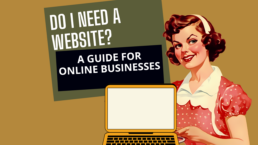
SEO
It’s a dilemma for the digital age. Do I need a website for my online business?
I know with the prominence of social media, that having a website feels about as necessary as having a house phone. Especially when you hear stories of influencers and entrepreneurs who simply started showing up and seemed to build a business overnight. But is it really that simple?
Do you need a website for an online business?
Although there’s no legal requirement, I would always say, YES! You do need a website for your business. Although the type of website depends on your business needs, it’s your very own piece of internet real estate. It’s where you can showcase your products, services, and most importantly, your unique personality.
When don’t I need a website?
Shocking, I know, but don’t worry, I’m not just doing a complete u-turn. In the interests of fair and balanced advice, I am going to admit that there are (very few) situations where you might not need a website or you may choose to begin your online business without one. And here they are:
1. You sell on marketplaces
Selling on Etsy, Amazon, or eBay? You might be able to get away without a website, especially if you’re just starting out.
2. You’re a local face-to-face legend
If your business is all about face-to-face interactions in your community, and doesn’t require clients, leads, sales or major marketing online, then a robust social media presence might be enough.
3. You’re testing the waters
Just dipping your toes into the online business pool? You might want to start with social media or a marketplace to gauge interest before investing in a website.
While these scenarios might make you think ‘I don’t need a website,’ it’s important to consider the long-term benefits.
5 reasons why you need a website for your online business
Now, before you navigate away from this article thinking, “Great! No website for me!” Let’s talk about why having a website might be the BEST decision since sliced bread. And if you’re still wondering ‘Do I need a website?’, read on!
1. You’re the boss
With your own website, you’re in control. No algorithm changes or platform rules can mess with your vibe.
2. Credibility is key
A well-designed website can make you look more professional and legit. People are used to being marketed to 24/7 and you need to earn their trust before they turn into loyal repeat customers.
3. SEO is the BFF to avoid FOMO
Sorry. Acronyms are all the rage in SEO (search engine optimisation). Want people to find you on Google? Don’t want people to miss out on your incredible product or service? Then you HAVE to get good with SEO. Otherwise, your wonderful website and all you have to offer is never gonna get found.
4. It’s your digital home
A place where all your content, products, and services can live harmoniously under one roof. A place that is exclusively yours, for nurturing your audience. Your social media channels are great for supporting your website, but if you get hacked or the algorithm changes or the platform goes down or becomes unpopular, you can kiss goodbye to all your content and your audience. You’re literally placing the keys to your success in someone else’s hands if you rely solely on social media.
5. Analytics are a goldmine
With your own website, you can deep dive into visitor data and make informed decisions knowing where your audience are spending their time and what they’re responding or not responding to.
Top 10 FAQs: Do I Need a Website for My Business? (according to Google)
Now, let’s tackle the top 10 questions on this topic, (as determined by Google).
1. Can I run a business without a website?
Yes, you can run a business without a website but it will be difficult. Like trying to zoom around the Mario Kart track with a load of banana skins in the way.
2. Is social media enough for a small business?
Social media can be enough for a small business, especially if you’re just starting out, but it’s not ideal and won’t allow you to grow. And remember, you’re building your house on rented land. So I wouldn’t advise it long-term.
3. How much does it cost to create a website?
It costs anywhere from free (if you’re DIY-savvy) to thousands of dollars/pounds for a custom-built site. There’s an option for every budget!
4. Can I use Facebook instead of a website?
You can, but see question 2. It’s like using a blunt butter knife for everything when what you really need is a full tool set. It might do the basics of the job, but not as effectively and it won’t allow you to grow in all the ways you could.
5. Do I need a website if I have a physical store?
If you already have a physical store, it’s still advisable to have a website presence. People shop in a multi-touch way these days. That means they might find you online, check you out in person, follow you on social media, and sign up for your emails, all BEFORE choosing whether or not to buy from you.
6. Is a website necessary for SEO?
You can actually do SEO without a website but it will be very limited. Having a website gives you much more control over your SEO strategy.
7. Can I succeed online without a website?
Success is possible, but a website can amplify your efforts and provide a central hub for your online presence. It’s a safer option than relying on social media or other “shared” platforms.
8. What are the alternatives to having a website?
Social media platforms, online marketplaces, and business directories are all alternatives, but they each have limitations.
9. Is a website or social media more important?
It’s not an either/or situation. Ideally, you want both working together to create a strong online presence.
10. How do I know if I need a website?
If you want full control over your online presence, want to be easily found on search engines, and want to provide a comprehensive resource for your customers, then you probably need a website.
The bottom line
Whether you need a website depends on your business goals, target audience, and resources. It’s not a one-size-fits-all situation.
But here’s my view. In most cases, having a website is a solid foundation for an online business, around which everything else can be built.
So, do you need a website in 2024? In most cases, the answer is a resounding YES!
March 22, 2024
WHAT YOU NEED TO KNOW ABOUT THE LATEST GOOGLE UPDATE
August 9, 2024
What is conversion copy?
September 6, 2024
Do I need a website? A guide for online businesses in 2025
April 18, 2024
Is your AI content safe to use?
7 Easy tips to make your email newsletter shine
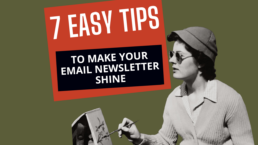
SEO
Are you a startup, savvy small business owner or artsy entrepreneur? 👋 Ready to start communicating with your audience through email? Don’t know where to begin?
Then let’s chat about creating a regular email newsletter. One that’ll have your audience looking forward to it hitting their inbox because they can’t wait to hear what you have to say.
What is an email newsletter?
Before we begin, let’s just clarify what an email newsletter is. And what it’s not.
An email newsletter is a regularly sent email communication that informs your audience about your business, your products or services and any related news and tips.
An email newsletter is NOT a promotional or sales email, even though there may be aspects of selling in some of your newsletters. Selling will not be the primary goal. If it is, then that’s actually a marketing email.
How is a marketing email different from a newsletter?
Email marketing allows you to target specific users or potential customers through segmentation and with personalised messaging. Marketing doesn’t just involve sales however. It can also include retention, launch sequences, welcome sequences, engagement and driving a specific action.
Newsletters on the other hand cover wider themes and look to educate and inform a wider audience, giving value and creating a stronger connection between your brand and your reader’s everyday life.
The two are interlinked though and provide support to one another. You’re less likely to trust a company that spams you with only sales emails every week. And you may not stay subscribed to a newsletter that never produces any offers or promotions. So the two are very much complementary.
Are email newsletters still relevant in 2024?
Absolutely! In fact the average ROI (return on investment) of email is 36:1, as of 2022. That means £36 for every £1 spent.
And although this is more likely to be in relation to specific marketing emails, your newsletters are really important in building long-term trust. They’re brand building without the higher costs that can be associated with other forms of paid advertising.
What program do I use to make an email newsletter?
There are lots of options for email platforms. It just depends on what features you need and what your budget is.
This email newsletter is coming to you through Substack – completely free. But it has limited features and design elements.
Other well-known and highly recommended platforms include Mailchimp, mailerlite and Flodesk. There are different tiers available for each of these and pricing and features vary, but they tend to have more design features and the ability to segment and personalise easily.
7 Simple steps for optimising your email newsletter
But now let’s get to those top tips. If you’re just starting out and sending your first email, or if you’ve been doing it a while but aren’t sure if your newsletters are hitting the mark, these tips will help optimise in 7 simple steps.
1. First things first: What's the point?
Ahhh, the million-dollar question. Before you start typing away, or having an existential crisis ask yourself:
- Why am I sending this email? (And no, “because I have to” doesn’t count!)
- What’s in it for my awesome readers?
- What do I want them to do after reading? (Spoiler: It’s not always “buy stuff”)
If you’re scratching your head, your email might end up being as exciting as watching paint dry. And trust me, nobody wants that!
2. Let’s get bizzy and set those goals!
You’re not here to be a pushy salesperson (ew), but you do need a game plan. Maybe you want your readers to:
- Check out your snazzy new website
- Read your latest mind-blowing blog post
- Watch that video where you finally nailed your dance routine (I mean, tutorial)
Whatever it is, make it crystal clear. Your readers aren’t psychic.
3. Subject line sorcery
Speaking of spooky, it’s time to channel your copy charm! Your subject line is like the cover of a book – it’s gotta be good, or no one’s opening that baby. Here’s what to do:
- Snoop through your own inbox. What makes you click? What makes you cringe? Take not of both. Make your own swipe file for future reference.
- Keep it short and sweet. No one likes a rambler. And a long subject line will get cut off by most email providers.
- Get creative! Funny, mysterious, personalise it – mix it up!
- Emojis can be fun, but use ’em wisely. No one wants to see 🎉🎊🥳 every time.
And don’t forget that preview text. It’s like a movie trailer for your email!
4. Structure it like a boss
Most people skim read online. So make it easy for them to pick up the jist and focus on the areas they’re interested in:
- Use headers to tell readers what each section is about
- Bullet points are your BFFs – if you’ve got a list to share
- Keep paragraphs and sentences on the shorter side. It’s easier to read and digest information. Especially if someone is reading on a mobile. A few sentences looks like a pretty chunky bit of text on a phone screen.
- Throw in some pics to break up the text (bonus points if they’re of cute animals or funny gifs)
Pro tip: Add a little intro and outro. Something like, “Hey there! I’m Jane, and I paint dreams on canvas. New here? Scroll down for a special ‘welcome to the madness’ discount!”
Your outro can include a link to your website and ways to work with you.
5. Links and CTAs: The dynamic duo
Links and Calls To Action (CTA’s) are going to take people away from reading your email, so be aware:
- Don’t go link crazy. Choice paralysis is real.
- Make sure links open in new tabs. Don’t kick people completely out of your email.
- Buttons are the bee’s knees for important stuff.
- Get personal with your CTAs. Instead of “Download the free guide,” try “Gimme that free goodness!”
- Or better yet, go for value: “Yes, I want to paint like a pro!”
6. Themes: Your content compass
Coming up with content ideas shouldn’t feel like pulling teeth. Pick 4-5 themes and stick to them:
- Your weekly adventures
- Tips for fellow professionals in your field or a lifestyle topic that your readers will relate to
- Behind-the-scenes peeks
- Industry hot takes
Mix and match. Your readers will know what to expect, and you won’t be staring at a blank page wondering what the flip to write about each time.
7. Polish that gem
Before you hit send:
- Get a second pair of eyes on it. Every great writer had an editor!
- Read it out loud. If you sound like a robot, rewrite it.
- A/B test. Most email providers have that feature available.
- Avoid sketchy “hacks” that will land you in spam jail.
- Run it through a spam checker. Better safe than sorry!
Bonus round!
Remember, writing the perfect newsletter is like perfecting your signature dish. The same formula doesn’t work for everyone. It takes time, practice, and a willingness to try different things.
If you see everything as an experiment, then you can’t fail. You only win or learn.
Now, off you go! Time to create an email newsletter that’ll make your audience hit reply just to say “Wow!” And if you need a hand with that writing magic, you know where to find me. ✨
April 18, 2024
Is your AI content safe to use?
April 16, 2024
10 Reasons you should be blogging for your business
December 29, 2024
What is the S.A.F.E Method?©
June 28, 2024
How to write a homepage
September 6, 2024
Do I need a website? A guide for online businesses in 2025
799 Spam Words To Avoid

SEO
Whether you’re writing a marketing email, pushing sales or crafting a weekly newsletter, one thing that you absolutely need to be aware of is triggering spam filters.
What is an email spam filter?
Email providers have spam filters and these look out for particular words, especially in certain contexts and make a judgment as to whether the email is spam or not. If it is deemed spam, it won’t reach the recipient’s inbox.
This can have a very big impact on your email success rate and is perhaps the first hurdle you need to overcome.
I’ve compiled a list of SPAM TRIGGER WORDS so that you can check your email before you hit send.
This list includes over 700 words.
Just remember, that these words alone aren’t spam. But they do indicate that the email could be spammy and within a given context, along with other spam trigger words, they could signal to email providers that your email is spam.
How to check your email for spam trigger words
You can do this manually.
Or, you can enter your text into this email spam checker and it will review it alongside a list of trigger words.
You can also check deliverability with this email deliverability test.
Grab the full list of almost 800 spam trigger words below. You can make a copy of it to keep.
September 6, 2024
Do I need a website? A guide for online businesses in 2025
April 18, 2024
Is your AI content safe to use?
August 9, 2024
What is conversion copy?
April 16, 2024
10 Reasons you should be blogging for your business
May 4, 2023
All About Copywriting
June 28, 2024
How to write a homepage
What is conversion copy?

SEO
Conversion copy is copy that nudges the reader towards taking action. It narrows the focus to just one goal, so that all other distractions are discarded and the reader is provided with the easiest and simplest path towards taking the desired action.
How does conversion copy differ from ‘content’ or other types of copy?
Writing ‘content’ can come in the form of guides, articles, blog posts etc. Many of these (not all) are in the ‘discovery’ part of a customer’s journey. They may not be aware of you, or they may be aware, but not know much about you and be looking for further information. At this stage, you don’t really want to be giving them the hard sell or pushing your product or service. That will most likely turn them off. If they have questions and they can’t find them on your site, they’ll probably go elsewhere. That means there’s huge value in this type of content, but it can be hard to track, because typically, a customer may read something on your site, go away for a bit, come back and read another article, go away again, come back again and on and on. It’s not a simple linear journey and so it’s harder to see the direct impact this type of content has on your bottom line.
Conversion copy, in comparison, assumes that the reader is in a stage of awareness, either of their problem or the solution that you can help with. Conversion copy narrows the focus to just one goal for the page, so that it can speak more directly to the needs and wants of ‘one reader’.

Do I need conversion copy?
Yup! If you have a landing page, with one goal, chances are, you need conversion copy to optimize the wording used and maximize the profitability of the page. If more people convert, whether that’s to subscribe, buy, register interest or some other goal, you’re going to see improvement.
Conversion copy narrows the focus of the page
Is conversion copy a guarantee?
No. Conversion copy (or any copy or content) is never a guaranteed ‘win’. This is because there are too many external variables and unknowns that can also affect the page or website, that a writer has no control over.
What can be guaranteed is a learning.
With conversion copy, we use data, proven psychological tactics and persuasive language to tap into logic and emotion. It’s not about making things fluffy and pretty. Everything is backed by data and science. It involves a lot of research.
And then we test.
The tests show us what performs better and so we can optimize even further, giving your product or service the best chance of success.
What do I do next?
- Make a list of the pages on your website that are driven by one goal. It might be a sales page, a subscription sign up page or something else.
- Check the copy on these pages. Does it speak to the Rule of One? Does it answer the questions a reader might have at the stage of awareness they are in?
- Does it remove anything that might distract them from completing the one goal?
If you need help with reviewing your sales and landing pages, drop me a message at danielle@writersofthelostart.co.uk.

June 28, 2024
How to write a homepage
December 29, 2024
What is the S.A.F.E Method?©
August 9, 2024
What is conversion copy?
April 16, 2024
10 Reasons you should be blogging for your business
December 29, 2024
What is the S.A.F.E Method?©
How to write a homepage

SEO
Your website’s homepage is like the train station of your business. Unlike the rest of your site, it needs to hold the information for each of your ideal customers or clients (because you might have more than one), on this single page, without becoming overwhelming or confusing. Which means there will be lots of people landing on this page trying to find out what you do and how to get further information from elsewhere on your site.
Because of this, homepages can be tricky to write.
Writing your own homepage with a template
If you’re attempting to write your own copy, a template is a great place to start. And I’ve made one for you so you don’t have to go scrabbling around the internet trying to figure out how to turn a blank page into something you can publish. Just don’t nail yourself to this or any other template, because you’ll end up looking and sounding the same as everyone else who has used it.
Use this template as a starting point and amend it, expand on it, wiggle it about to make it suit your business and your voice.
The guide below can help you to write your own homepage from scratch or review your current one. It works as a stand alone guide or in conjunction with the template. If you’re completely new to copywriting I’d recommend using both the guide and the template hand in hand.
Off we gooooooooo!
Navigation
Your navigation header should show the other most important areas of your website that people can navigate to. There’s no hard and fast rule on what this should look like. You might have them across the top in a straight line, or some to the left and some to the right. You also get to choose what those areas are, depending on what your business is about and what you sell. Research shows that most of us read in an F pattern, so place your most important links to the right, as that’s where our eyes are most drawn to.
Above the Fold
The “above the fold” or “hero” section is everything you see before you scroll down. It’s the most important part because what you say there has to make people want to stay on your site. It should be really clear what you do and who you serve. Try the 5 second rule. Ask someone to look at your homepage for 5 seconds—no more—and then ask them to tell you what they understood from what they saw in that short space of time.
Your Headline, or H1, should be smart, captivating and include your main keyword.
A sub-header underneath your captivating headline, should be a statement that expands on what you do, but be reader focused. They need to see how they could benefit from working with you or buying from you.
See these examples below.
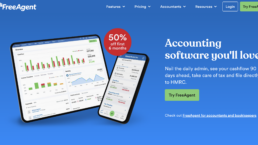
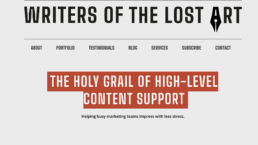
Benefits
If people scroll down the page or click into a “read more”, now is the time to sell your offering so that the reader can understand what’s in it for them. Keep it reader, or “you” focused but think about answering some of the following:
- What are the benefits of working with you or buying from you?
- Why should they choose you?
- What makes you qualified?
- What are your values?
- Why do you do what you do?
- How can that be helpful for them?
You could probably write a whole page on this, but choose your words wisely and stick to no more than 5 lines. A short introduction to you and your business.
Services or Features
Sell your services in this next part. Be clear. People want to know exactly what they’re buying or signing up for. What do they get? BUT, it also needs to be concise. Add a button so they can click through to a services page for a full breakdown of what’s included.
Social Proof / Convincing
Now you need to convince your reader that they should choose you, or go to another page on your website for more information. Social proof can be testimonials, reviews, portfolio examples, or some statistics about how many people you’ve helped or products you’ve sold or success.
About / Your Story
In this section, introduce yourself a bit more personally. Who are you? And what do you do? Add a button to click through to an “About” or “Our story” page where you can really go to town on how your business came about.
Lead Magnet
Got a freebie you want to share? A download? A webinar? A newsletter? Add it in this section. Lots of businesses produce lead magnets in which you need to give your email address in order to get access. It’s a great way to build an email list, give an incentive for people to join and for the audience, it’s low risk. However, you must make sure your freebie is high value. Give away as much as you can because it will only serve you better.
Resources
This is your opportunity to build more trust and show that you are an authority in your field. Share your blog and socials so that people can follow you. They may not be ready to buy from you yet, but willing to engage with you in other ways.
Closing Call To Action
End your page with a final call to action. This could be to sign up for a discovery call, book an introductory call, or buy a product or a service. What is it that you’ve been slowly leading people towards on this page? This is your last chance to persuade them, so make your CTA compelling.
Footer
And last but not least, your footer. Like the navigation this will appear everywhere on your site. Don’t overload it, but add important links here that you want people to be able to find and access easily. Terms & conditions, copyright, privacy policies, contact and any important logos should go here too, as well as social icons.
This is my first attempt at a page template, so I’d love to hear what you think of it. Pop me an email at danielle@writersofthelostart.co.uk if you have any feedback, good or bad!
And if you need help with your website, fill in my short questionnaire and I’ll get back to you with a quote and details of how you can take your next steps towards great copy. Yes, even if that means signposting you to someone else!
December 29, 2024
What is the S.A.F.E Method?©
April 18, 2024
Is your AI content safe to use?
September 6, 2024
Do I need a website? A guide for online businesses in 2025
May 4, 2023
All About Copywriting
WHAT YOU NEED TO KNOW ABOUT THE LATEST GOOGLE UPDATE
The latest (March 2024) Google update is rolling out now.
If you write your own content and use ChatGPT or other AI to help, you need to read this.
The latest Google update is going to affect you. and here's what you need to know.

Like most copywriters, when ChatGPT became available to the masses, I saw clients and businesses big and small swoon at it.
I saw writers lose jobs to it. Companies saw a way to trim their budgets and produce content at scale, much faster. It seemed pretty ‘passable’ content too.
And for FREE!
I get it. I’d probably have done the same if I wasn’t a copywriter or didn’t know much about SEO.
But we’re now seeing (not the first) but probably the biggest crackdown on scaled AI content.

Google updates happen regularly. Sometimes they don't even tell us when they're happening. And sometime, when they're very significant, they do.
Right now, Google is in the middle of a core update.
Here’s what it’s looking at. Straight from the horse’s mouth.
Improved quality ranking: (They’re making algorithmic enhancements to their core ranking systems to make the most helpful content appear more and reduce unoriginal content in search results.)
New and improved spam policies: (They’re updating their spam policies to keep the lowest-quality content out of Search.)
They expect that the combination of this update and their previous efforts will collectively reduce low-quality, unoriginal content in search results by 40%. (That’s a lot!)
You can read the full info about this Google update here.
SO WHAT ABOUT AI AND CHATGPT?
The use of ChatGPT or other AI isn’t being targeted by Google updates. It's not banned by Google or considered inherently bad. UNLESS you use it to produce content, at scale, with the goal of manipulating search rankings. This is called Scaled Content Abuse.
This kind of content is all about putting stuff out there for the sake of it, because you think it will help you, but without adding real value for your audience.
While there are lots of useful guidelines about what Google deems helpful content, (like E-E-A-T) you should always be writing for PEOPLE NOT GOOGLE.
WHAT THIS MEANS FOR YOU
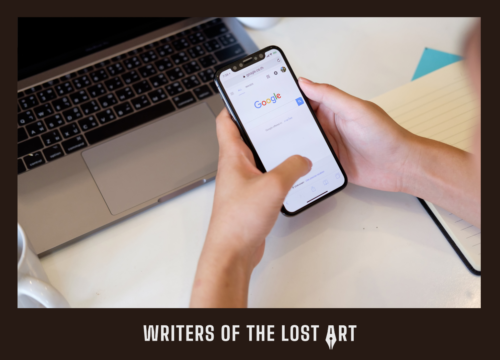
- If you stopped writing or using a copywriter to create a couple of blog posts a month in favour of using ChatGPT to produce more posts, more quickly and for free, and posting them as is, that’s scaled content abuse.
- If you’ve used ChatGPT to create loads of headlines, meta descriptions or product descriptions and used them without re-writing to be more helpful or relevant to your business, that’s scaled content abuse.
- If you’ve used ChatGPT to re-write a bunch of guide and blog posts from your competitors, that’s scaled content abuse.
- If you’ve used ChatGPT to batch write your social media posts and then posted them without any re-writes or tweaks to make them relevant and helpful to your audience - yep, you’ve guessed it, that’s scaled content abuse.
If you’ve done any of these things, you might also have noticed a decrease in your engagement.
But the worst case scenario is that your website gets de-indexed or heavily penalised by Google. That means no one will see it.
All your hard work and digital presence - gone. Wiped out. Buried.
Coming back from that is challenging and takes time (and money). There's no quick fix. And if anyone tells you different, run the other way. Fast.
A lot more effort than if you’d invested in the right way to begin with and followed the advice of those in the know.
If you’re worried, message me, I’m happy to advise. Because this update isn’t finished and there’ll be more.
See you next time
Danielle
x
How To Hire A Copywriter

SEO
Hiring a copywriter will be one of the most important marketing decisions you’ll make for your business. Sure, there are plenty of cheap and fast options through sites like Fiverr and Upwork, but there’s also a high probability that the work will not be to the standard you need. The old adage is usually true here. You really do get what you pay for. So before you make any hiring decisions, make sure you read this article to put you in the best position possible.
Copywriting Tips
A good copywriter is going to be aware of the following, and so you should be too.
- Knowing the Audience: Understanding your audience’s needs, interests, and pain points is crucial to creating effective copy.
- Use of Power Words: Power words are emotionally charged words that can persuade readers to take action. They should be suited to your brand, however, and used at the right time in the right way. Not everything needs to have a sense of urgency for example.
- Focus on Benefits, Not Features: Highlighting the benefits of a product or service helps readers understand how it can meet their needs and solve their problems. For example, would you like to learn a 5-minute breathing exercise that can be done anywhere, anytime, that slows down your heart rate? OR, would you like to reduce your anxiety in 5 minutes?
- Keep it Simple: Clear and concise copy is easier for readers to understand and remember.
- Test and Refine: Testing different versions of copy can help identify what works best and refine your messaging over time. This is especially true when launching a new business, product or service.
What to Look for When Hiring a Copywriter
If you’re interviewing or putting out a job ad for a copywriter, or maybe you’re just searching online for someone, look out for or ask about the following skills and qualities.
1. Creativity
A skilled copywriter needs to be creative to come up with messaging that stands out from competitors. They need to be able to think outside the box and craft messaging that is unique to your brand.
2. Research Skills
A skilled copywriter needs to have strong research skills to understand your industry, target audience, and competition. They need to be able to conduct research that informs their messaging.
3. Persuasion
Copywriting is all about persuasion. A skilled copywriter needs to be able to craft messaging that persuades people to take action, whether it’s buying a product, signing up for a service, or supporting an idea.
4. Attention to Detail
Copywriting is not just about crafting a message, but also ensuring that it’s error-free and polished. A skilled copywriter needs to have an eye for detail and be able to proofread their work thoroughly. A good understanding of grammar, and spell checking are a must.
5. Adaptability
A skilled copywriter needs to be adaptable and able to write for different mediums and audiences. They need to be able to adjust their tone, messaging, and style to fit the needs of the project. They need to be able to understand you, your business and brand and your audience’s needs and wants.
6. Understanding of Marketing and Psychology
A skilled copywriter needs to have an understanding of marketing and psychology. They need to be able to tap into the emotions of their target audience and create messaging that motivates them to take action.
"I have a very particular set of skills"
How to Find a Skilled Copywriter
Now that you understand the importance of skilled copywriting, you might be wondering how to find a copywriter that meets your business’s needs. Use the following tips as a checklist when reaching out or interviewing.
1. Look for Experience
When looking for a copywriter, experience will likely cost more, but will also get you a much higher quality of work. Look for a portfolio that showcases their previous work, and make sure that they have experience in your sector/industry and a style of writing that you like and that you could see adapting well to your brand.
2. Check References or Testimonials
Don’t be afraid to ask for references from previous clients or workplaces. This can give you insight into their work ethic and whether they’re reliable. A lot of writers who work freelance, like me, have testimonials on their website or they can be made available at request.
3. Communication is Key
When hiring a copywriter, communication is key. Make sure that they understand your business’s goals and can communicate with you effectively. In this post-pandemic world, more business is done online and remotely than ever before. Video calls, emails, slack, Teams, Trello – there are countless ways to keep in touch. It’s best to set out your expectations before any work starts. For example, if you would like daily or weekly updates and via email rather than slack, ask if this is possible.
4. Get a Quote
Before hiring a copywriter, get a quote for their services. The more specific you can be with your brief, the better. Copywriting doesn’t just involve actual writing. There may be subject/topic research, keyword research, proofing and editing involved too. So a 1,000-word article may take longer than you think. Some copywriters charge by the hour, some by article, and many have day rates. They can also charge per word or by the project. The better the scope and brief you are able to give, the less room for error or confusion.
If you’re ready to start gathering this info and find yourself the perfect copywriter, why not start with me! Pop your particulars here with a short note and I’ll be in touch. Or email danielle[at]writersofthelostart.co.uk.
April 16, 2024
10 Reasons you should be blogging for your business
May 4, 2023
All About Copywriting
June 28, 2024
How to write a homepage
September 6, 2024
Do I need a website? A guide for online businesses in 2025
April 18, 2024
Is your AI content safe to use?
August 9, 2024
What is conversion copy?
All About Copywriting

SEO
Don’t worry. You’re not the first to wonder what a copywriter actually does, or get it mixed up with copyrighting (totally different thing.) If your business is new or just launching online, you might have no idea where to start. So let me introduce you to the world of a copywriter and help you understand why you probably need one. Trust me, it’s going to make those website conversations so much easier.
What is Copywriting?
Copywriting is a specialised form of writing that aims to persuade readers to take a specific action, such as buying your product, signing up for a service, or clicking a link. It is a vital component of marketing and advertising that seeks to engage, inform, and compel audiences to act.
“I don’t think anyone wants to be one of a hundred colors in a box.”
What is a Copywriter?
A copywriter is a person with those specialised writing skills, who will write the copy, (words), for your website and other marketing materials such as emails, leaflets, posters and social media posts. There are many different ways to market your business and so you’ll often find that copywriters specialise.
Types of Copywriting
There are several types of copywriting, including:
- Direct Response Copywriting: This type of copywriting aims to elicit an immediate response from the reader, such as making a purchase or filling out a form.
- Brand Copywriting: This type of copywriting is focused on creating and promoting a brand image through messaging and storytelling.
- SEO Copywriting: This type of copywriting aims to improve website rankings and attract organic (unpaid) traffic. It optimises content for both readers and search engines to easily understand.
- Content Marketing Copywriting: This type of copywriting focuses on creating valuable and informative content that attracts and engages potential customers.

Why is Copywriting Important?
Effective copywriting can drive sales, increase brand awareness, and establish a strong online presence. These days, if you’re not online, you’re missing a huge chunk of potential customers.
Copywriting allows businesses to communicate their message to their audience in a compelling and persuasive way, as well as helping to establish credibility and build trust with customers. Trust is one of the major signals that search engines use when ranking websites, so it can heavily impact whether you rise to the top or sink to the bottom of search results.

Help me, help you
Why Use a Copywriter? Why Not Just Do It Yourself?
You wouldn’t try to rewire your own house if you’re not an electrician. Well, you could try, but it would likely end up in disaster and cost you more money to fix.
A skilled copywriter has the knowledge and experience to create a meaningful connection with the reader, tapping into their emotions, and motivating them to act. Getting it right will set successful businesses apart from their competitors. Here’s why hiring a professional is worth it.
1. Increase Sales
Copywriting is all about persuasion. A skilled copywriter can craft a message that resonates with your target audience, leading to more sales. Good copy can convince people to take action and buy your product or service.
2. Improve Brand Awareness
Copywriting is also about creating a unique voice for your brand. Telling your story, your way. A skilled copywriter can create messaging that sets your business apart from others in your industry, by bringing out the authenticity and integrity of your brand. This can lead to improved awareness and recognition.
3. Boost Your Website’s SEO
SEO, or search engine optimisation, is the practice of optimising your website to rank higher in search engine results pages. Skilled copywriting is an integral part of making sure readers and search engines find your website a good experience, full of expertise, authoritativeness and trustworthiness. These four components, also referred to as E-E-A-T are key points used by Google to assess whether your website is high quality and whether it contains helpful content.
4. Establish Trust
Trustworthiness is also vital in the relationship you build with your audience. A skilled copywriter can create messaging that establishes trust with your target audience, making it more likely that they will become loyal customers and advocates for you.
5. Save Time
If you’re a busy business owner, you likely don’t have time to craft high-quality messaging for your business. Hiring an experienced copywriter can save you time and stress, allowing you to focus on other essential aspects of your business.
December 29, 2024
How to DIY your website: The HOME PAGE edition
April 18, 2024
Is your AI content safe to use?
December 29, 2024
What is the S.A.F.E Method?©
September 4, 2024
799 Spam Words To Avoid
December 29, 2024










